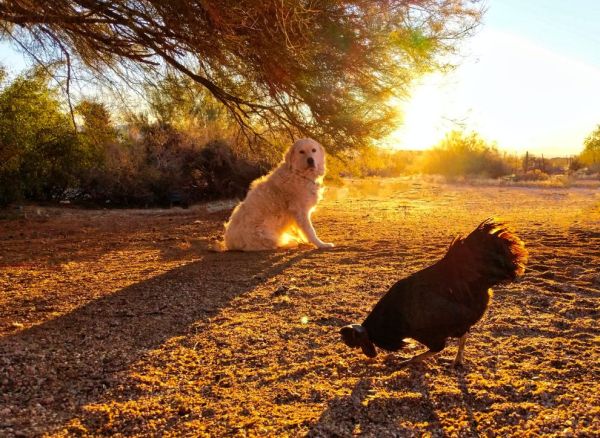Finding the best guard dog for chickens is essential for poultry farmers who want to protect their flock from potential predators. Guard dogs provide a natural form of protection, and it’s necessary to understand the key traits to look for when selecting the right breed.
Each breed has strengths and characteristics, from the Great Pyrenees to the Anatolian Shepherd to the Komondor. In this article, we’ll discuss the best guard dog for chickens and the essential steps to train your dog to protect your flock.
Key Takeaways
- Guard dogs protect chickens and other poultry from predators.
- Genetic traits of certain breeds make them better protectors of livestock.
- Working dogs, like the Anatolian Shepherd, have guardian breed traits that make them excellent watchdogs.
- Proper training can make guard dogs invaluable assets to poultry farms.
Understanding the Role of Guard Dogs in Poultry Farming
Guard dogs are essential to poultry farming, protecting chickens and other poultry from predators. Witnessing behavior from the guard dog, such as barking, is often enough to scare off potential predators.
Genetic traits are also important when selecting a guard dog for chickens; certain breeds have been bred to be better livestock protectors. Working dogs, such as the Anatolian Shepherd, are known for their guardian breed traits, making them excellent watchdogs.
With proper training, these dogs can become an invaluable asset to any poultry farm, providing the farmer with a strong sense of security and peace of mind.
Key Traits to Look for in a Chicken Guard Dog
When selecting a canine to protect chickens, it is important to consider certain traits that make them well-suited for the job. Knowledge of animal behavior and understanding a canine’s natural guarding instincts are key when selecting a breed.
Careful breed selection can help ensure the canine is well-suited to the task, and knowledgeable canine care is needed to ensure the animal remains healthy.
Safety is also paramount when selecting a guard dog for chickens; ensuring the animal is well-trained and that the chickens have a safe environment in which to roam is essential.
With the right traits, a guard dog can be invaluable in protecting poultry flocks.
Overview of the Best Dog Breeds for Guarding Chickens
Selecting a canine breed for protecting chickens requires careful consideration of the animal’s natural guarding instincts and behavior. Anatolian Shepherd Dogs are among the most popular guard dog breeds, renowned for their loyalty and protective instincts. They are known for their watchful eyes and alert demeanor, making them ideal for poultry farming.
Other guard dog breeds well-suited for protecting chickens include the Komondor, Akbash, and Maremma Sheepdog. These breeds have the necessary temperament and attitude to ensure chicken safety.
When selecting a guard dog breed, it is vital to research the animal’s innate guarding instincts and behavior to ensure it is well-suited for the task. With the right breed, a guard dog can provide invaluable protection to a flock of chickens.
The Great Pyrenees: A Natural Protector
The Great Pyrenees is renowned for its natural protective instincts and makes a great companion for poultry owners. Its strong hunting instincts make it one of the top protection breeds, and is well-suited for its guardian role. The breed is known to be loyal and devoted and can help keep chickens safe and secure from predators.
For optimal chickens’ safety, providing them with appropriate fencing and socialization is recommended. The Great Pyrenees is ideal for poultry owners looking for a canine guardian.
Anatolian Shepherds: Fierce and Loyal
Highly praised for their fierce loyalty, Anatolian Shepherds are often sought after for their protective abilities. With proper leash training, these large dogs can be taught to patrol the area at night and guard chickens from predators.
They are intelligent enough to learn commands quickly and respond to their owners’ needs. A kennel is recommended for these guard dog breeds as it gives them a safe place to sleep and can help to contain their natural prey instincts.
Anatolian Shepherds are known for being alert and attentive, making them excellent guardians for chickens.
Komondor: The Unconventional Guardian
The Komondor is an unconventional guardian but a fiercely loyal breed of guard dog that can be an excellent fit for protecting chickens. With the right protected area setup and fencing options, Komondors can help keep chickens safe from predators. They are also protective of their pack, so they can help keep intruding animals away from the area.
Komondors can also help chickens follow their instincts, as they naturally stay close to their flock. As one of the oldest guard dog breeds, Komondors are known for their strong watchdog abilities, making them an ideal choice for guarding chickens. They have a strong protective instinct and a keen sense of smell that can help alert them to any potential danger.
While Komondors can be intimidating to strangers, they can be great protectors of chickens and other livestock.
Training Your Dog to Protect Your Chickens
Proper training is essential for your dog to protect chickens effectively. Proper socialization, including chicken exposure, should begin as soon as possible. Introducing your dog to chickens in a controlled and positive environment is vital to creating a bond between the two.
Your dog should also be taught to recognize predators, such as foxes or hawks, and be trained to respond to commands like ‘attack’ or ‘stop.’ Behavior modification techniques, such as positive reinforcement, can be used to help your dog learn to protect chickens.
Daily exercises like running and herding can keep your dog fit and provide mental stimulation. Finally, selecting the right equipment, such as a sturdy collar, leash, and harness, is essential for safety and control.
With the proper training and support, your dog can become a reliable guardian for your chickens.
Tips for Introducing a Guard Dog to Your Flock
Introducing a guard dog to your flock is important step in protecting your chickens from predators. It is essential to understand the instinctive behavior of the breed of dog you choose, the breed characteristics, and the importance of proper socialization.
When introducing the guard dog to your chickens, provide a safe space, such as a secure kennel, and establish a routine to help the dog become familiar with the flock. This routine can include supervised visits to the chicken coop and gradually increasing the time the dog spends with the flock.
Additionally, ensure the guard dog gets the proper nutrition and exercise it needs to stay healthy and alert. A well-fed and exercised dog will be more effective in protecting the chickens.
Ultimately, you can successfully introduce a guard dog to your flock by understanding the breed characteristics and providing the guard dog with shelter, proper nutrition, and socialization. This will help ensure the safety and well-being of your chickens.
Frequently Asked Questions
How Long Does It Take to Train a Guard Dog to Protect Chickens?
Training a guard dog to protect chickens is a rewarding experience that requires dedication and commitment. Selecting a loyal, intelligent breed with a strong prey instinct is crucial. In addition, the dog must be in good health and receive proper health care.
Socializing techniques and reinforcement methods are essential to help the dog bond with the chickens and must be practiced consistently. Remember that this process takes time and patience, but the result is worth the effort.
With the right breed selection, health care, and training methods, you can have a guard dog protecting your chickens quickly.
What Is the Best Way to Introduce a Guard Dog to Chickens?
Introducing a guard dog to chickens is a process that requires special care and attention. It is important to ensure that the dog is properly socialized and that the chickens become accustomed to the animal’s presence.
When selecting a breed, it is crucial to choose one that will not pose a threat to the chickens. It is also important to ensure that the chickens are predator-proofed and their health has been checked. This will help to ensure the safety and well-being of the chickens.
How Much Space Is Required for a Guard Dog?
When considering how much space is required for a guard dog, there are several factors to consider.
Outside exercise, kennel size, bonding time, and breed selection are all important for determining a guard dog’s correct space.
For example, a larger breed may need more space to run around and exercise, while a smaller breed may need less.
Also, if the guard dog will be kept in a kennel, the size of the kennel will need to be considered.
In addition, the environment will play a role in how much space is required for a guard dog, as some breeds may need to be kept in a cooler climate.
Ultimately, by carefully considering all these factors, one can determine the perfect amount of space for any guard dog breed.
What Is the Average Lifespan of a Guard Dog?
It is often assumed that a guard dog’s lifespan is quite long; however, this is not necessarily the case. The average lifespan of a guard dog is typically between 10 and 13 years.
While this may seem like a significant amount of time, it is important to remember that many factors influence a dog’s lifespan, such as breed selection, socialization benefits, dog health, and early training.
Furthermore, behavioral issues can also affect a dog’s life length. Therefore, it is essential to consider these factors when selecting a guard dog to ensure it reaches its full potential.
Conclusion
Having a guard dog on hand is an invaluable asset to any poultry farmer. With the right breed and proper training, a guard dog can be a trusted companion that will protect chickens from predators.
As the old adage goes, “A dog is a man’s best friend,” and this is especially true when it comes to protecting one’s flock. With the right breed and proper training, poultry farmers can trust that their guard dog will remain vigilant and their chickens will be safe.

